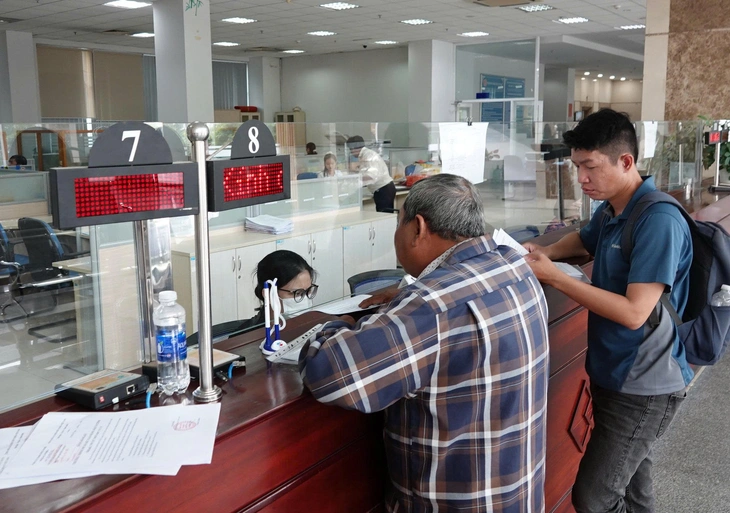
People come to do procedures at Ho Chi Minh City Tax Department on the afternoon of July 2 - Photo: TTD
In Resolution No. 191/NQ dated June 26, the Government assigned the Ministry of Finance to study and adjust the family deduction level, taking into account the differences between regions and areas.
This is a very new requirement stemming from the fact that recently many taxpayers believe that the current family deduction level is too outdated and cannot keep up with real life.
Expected to increase family deduction in October
Regarding the progress of amending the Law on Personal Income Tax (PIT), answering the press at the regular press conference of the Ministry of Finance on the afternoon of July 2, Mr. Truong Ba Tuan, Deputy Director of the Department of Management and Supervision of Tax, Fee and Charge Policies (Ministry of Finance), said that the Government has assigned the Ministry of Finance to develop the Law on Personal Income Tax (PIT) to submit to the National Assembly the draft law at the session taking place in October this year.
Previously, in the proposal document for this draft law, the Ministry of Finance reported to the Government to amend all regulations related to the current personal income tax policy with 6 policy groups, including policies that will contribute to reducing tax obligations for taxpayers.
Specifically, regulations related to taxable income and tax calculation for each type of taxable income will be completed; tax-exempt income will be added to promote the development of priority industries and sectors such as income from the transfer of green bonds and emission certificates.
In addition, the Ministry of Finance also proposed to adjust the taxable revenue for the income of households and individuals doing business to suit the practical situation. On the other hand, it reduced the tax rates of the progressive tax schedule for income from wages and salaries.
"In particular, the Ministry of Finance is studying the adjustment of the family deduction level (GTGC) to ensure it is consistent with changes in living standards, price indexes and other macroeconomic indicators. At the same time, it is supplementing charitable and humanitarian contributions and other specific deductions such as medical and educational expenses when determining taxable income," said Mr. Tuan.
Speaking further with Tuoi Tre, Mr. Tuan informed that according to the current Personal Income Tax Law, in case the consumer price index (CPI) fluctuates by more than 20% compared to the time of the most recent adjustment of the personal income tax rate, the Government will submit to the National Assembly Standing Committee to adjust the personal income tax rate in accordance with price fluctuations.
"According to the monitoring of the Ministry of Finance, the fluctuation of CPI from 2020 (the time of applying the current VAT rate) to the end of this year could reach 20%. Therefore, to ensure the rights of taxpayers and comply with the provisions of the Law on Personal Income Tax, the Ministry of Finance is studying and drafting a resolution of the National Assembly Standing Committee on adjusting the VAT rate of personal income tax to report to the Government and report to the National Assembly Standing Committee for consideration and decision.
In Resolution No. 1326/2024 of the National Assembly Standing Committee on the 2025 work program, it is expected that the National Assembly Standing Committee will consider and approve this resolution at the meeting taking place next October," said Mr. Tuan.
Family deduction by region
Speaking with Tuoi Tre, Mr. Nguyen Ngoc Tu, a tax lecturer at Hanoi University of Business and Technology, said that the bottleneck and biggest drawback of the Personal Income Tax Law is the VAT rate.
The regulation states that if the consumer price index fluctuates by 20%, the Government will submit to the National Assembly Standing Committee to adjust the corresponding VAT rate. Meanwhile, the spending of people and individual taxpayers is mainly on essential goods such as food, housing, clothing, transportation, education, etc. While the CPI calculates the prices of several hundred different goods and services.
Therefore, in the recently issued Resolution 191 of the Government, the Government directed the Ministry of Finance to study and adjust the GTGC level taking into account regional characteristics, which Mr. Tu assessed as very appropriate.
If the GTGC level is regional, it will overcome the current shortcomings. Because the spending level in big cities like Hanoi and Ho Chi Minh City is much more expensive than in other areas. For example, the price of houses, 1m2 of apartments in these two places is up to hundreds of millions of VND, while the price of houses in neighboring provinces is much softer.
Sharing this view, Mr. Nguyen Duc Nghia, Deputy Director of the Center for Supporting Small and Medium Enterprises under the Ho Chi Minh City Business Association, said that the regional minimum wage regulated by the Government should be used as the basis for calculating the GTGC because the regional minimum wage itself distinguishes the regions where workers live.
The personal income tax for taxpayers should be calculated at 4 times the regional minimum wage. If possible, the personal income tax for people in Ho Chi Minh City or Hanoi should be raised to nearly 20 million VND/month. At the same time, the personal income tax for dependents should be raised to 2 times the regional minimum wage, which is somewhat reasonable and close to the current living standards of workers.
Furthermore, the regional minimum wage also has a solid legal basis for the tax sector to implement. Regarding concerns about the complexity and difficulty of applying different levels of GTGC, Mr. Nghia said that it should be based on the actual place of residence of the employee, for example, setting a level of 183 days to distinguish between residents and non-residents as with foreigners currently. This is not difficult to apply at all.
Speaking with Tuoi Tre, lawyer Tran Xoa, director of Minh Dang Quang Law Firm, said that the regional minimum wage increases every year, so why not use this level to flexibly regulate the GTGC level?
He suggested setting the GTGC level at 5 months of the regional minimum wage, so that when the regional minimum wage is adjusted, the GTGC level will also increase. If the GTGC level is set at a fixed number as it is now, it will easily fall into a situation where it is outdated before it is applied and we will have to wait a long time before it can be raised.
The Personal Income Tax Law stipulates that when the CPI index announced by the General Statistics Office increases by 20%, it is proposed to adjust the value added tax. However, the current CPI list includes up to 752 items, while workers only use a few dozen essential items.
"Therefore, it would be unreasonable to wait for this general CPI index to be used as a basis for proposing to raise the GTGC level. In other words, this general CPI index does not represent the lives of workers, so using it as a basis to propose to raise the GTGC level would be very disadvantageous for wage earners," said Mr. Xoa.
New family deduction should be applied for tax period 2025

Spending levels in big cities are much higher than in rural areas, so according to experts, the current family deduction level should not be applied in the same way - Photo: TTD
Regarding the National Assembly Standing Committee's decision to raise the personal income tax rate in its October session, Mr. Nguyen Ngoc Tu said that it would be a great encouragement for personal income tax payers. However, he noted that the personal income tax rate and the time of application are issues that need to be discussed.
"The Ministry of Finance should boldly propose to the Government and report to the National Assembly Standing Committee to allow the application of the new GTGC rate from the 2025 tax period. In particular, the GTGC rate needs to be calculated to ensure sharing difficulties with taxpayers, not mechanically increasing the 20% level of 11 million VND/month that has been applied for a long time.
While waiting for a comprehensive revision of this law, the minimum wage of 16 or 18 million VND as proposed by many ministries and sectors should be considered and studied. An appropriate minimum wage will encourage and create great motivation for workers to work hard, contributing to achieving the economic growth target of over 8% this year and aiming for double digits in the following years," Mr. Tu suggested.
Source: https://tuoitre.vn/nguoi-nop-thue-thu-nhap-ca-nhan-cho-tin-vui-giam-tru-gia-canh-20250702234720116.htm




![[Photo] General Secretary To Lam attends the opening ceremony of the National Achievements Exhibition](https://vphoto.vietnam.vn/thumb/1200x675/vietnam/resource/IMAGE/2025/8/28/d371751d37634474bb3d91c6f701be7f)
![[Photo] Politburo works with the Standing Committee of Cao Bang Provincial Party Committee and Hue City Party Committee](https://vphoto.vietnam.vn/thumb/1200x675/vietnam/resource/IMAGE/2025/8/28/fee8a847b1ff45188749eb0299c512b2)
![[Photo] Prime Minister Pham Minh Chinh meets with Speaker of the New Zealand Parliament Gerry Brownlee](https://vphoto.vietnam.vn/thumb/1200x675/vietnam/resource/IMAGE/2025/8/28/cec2630220ec49efbb04030e664995db)
![[Photo] General Secretary To Lam presents the 45-year Party membership badge to comrade Phan Dinh Trac](https://vphoto.vietnam.vn/thumb/1200x675/vietnam/resource/IMAGE/2025/8/28/e2f08c400e504e38ac694bc6142ac331)

![[Photo] Red flag with yellow star flutters in France on National Day September 2](https://vphoto.vietnam.vn/thumb/1200x675/vietnam/resource/IMAGE/2025/8/28/f6fc12215220488bb859230b86b9cc12)































































































Comment (0)